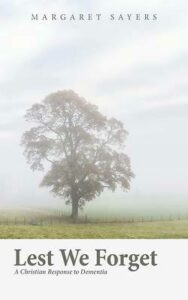Liturgies Against Dementia: Inside Margaret Sayers’ ‘Lest We Forget: A Christian Response To Dementia’.
Philosopher James K.A. Smith defines liturgy as a physical or embodied practice that infuses noncognitive dispositions and skills within us through ritualistic repetition. Because our minds and hearts are so tethered to our bodies, what we do is deeply linked to what we desire and, to a certain degree, how well we know something.
Without explicitly mentioning it, Margaret Sayers hits on this topic in her short book “Lest We Forget: A Christian Response to Dementia.” In less than 40 pages, she outlines a few helpful remedies for a host of challenges that come with old age, frailty and conditions such as dementia. The recommendations are meant primarily for caregivers or those who often interact with a family member in such conditions, for instance.
 In an interview, Sayers highlighted the explicitly religious nature of her work.
In an interview, Sayers highlighted the explicitly religious nature of her work.
“Every specific goal was to write something for Christians, who in my experience in many years of practicing, have had such a difficult time with caring for someone in the middle to end stages of dementia,” Sayers said. “Often, in those stages, their behavior becomes totally inappropriate to what they would be doing if they didn’t have dementia, and their language was often problematic for very conservative Christians.”
In the book’s introduction, she points out the particular religious aspect of memory loss: how it may affect one’s ability to both recollect and correctly interpret Scripture. In the first chapter or “distressing scenario” of her book, she notes that amid the frustration and anxiety of memory loss, that this is exactly where “God’s Word or a favorite hymn can bring comfort and reassurance.”
Sayers is not intentionally using a Christianese cliché. Rather, she is tapping into the real power that comes from Christians’ belief in the Bible and praise to possess, especially in terms of assurance and comfort. Further, she understands that the repetition of such passages or hymns of comfort may have an effect on the retention of religious knowledge, and if not, at least provides momentary comfort or relief.
READ: What happens to faith in dementia?
The person experiencing memory loss, for instance, “may find enjoyment and comfort in singing familiar hymns with you or repeating a portion of scripture that you know they have been familiar with and may have often repeated to you,” she writes. “Those words may come quickly and be a sense of encouragement to them.”
She elaborates further in the section titled “Paranoia,” further discussing how important these kinds of liturgies are for the patient in question.
“For the (Christian) with memory loss,” she says in the book, “their paranoia may evolve into a fear that they have sinned, terrible things are happening, or that God does not love them anymore.” The Smithian liturgy of reciting hymns and passages repeatedly helps the patient recall and reinforce their spiritual knowledge. These kinds of liturgies are also an immense source of comfort, which is something that Sayers emphasizes.
Sayers begins and ends her book with remarks about how anybody’s mind can deteriorate as he or she ages. Nobody is necessarily safe from conditions such as dementia or Alzheimer’s. Because of this, she realized that one’s faith and faith life face unique challenges with these kinds of infirmities.
“This is a common problem, and I’ve seen it over and over again,” Sayers said. “It’s hard for families, any family, whether you’re Christian or not, to see how loved ones change when dementia takes over their personality. But I found it particularly difficult for Christians because these saints used to be the pillars of their local church, and suddenly they weren’t.”
Likewise, she writes that after the death of one of her patients who inspired the book, she quickly realized that “even the most devout follower of Jesus may suffer the ravages of a deteriorating mind,” and so, “caregivers must understand this possibility and be ready to offer words of peaceful comfort through music, prayer, and their presence.”
READ: “The Father” is an intimate look at dementia and a daughter’s love
On the surface, this kind of spiritual remedy seems to merely make the best out of a bad situation, and based on the text alone, the reader is left wondering at the efficacy of such rituals, given that Sayers’ book is very short and her discussion of the conditions even shorter. Sayers believes that both encouragement and comfort form a part of a holistic health care for patients suffering from dementia.
I want my patients and their families to know that it is possible to forestall medications since they have terrible side effects
“I want my patients and their families to know that it is possible to forestall medications since they have terrible side effects,” Sayers added in the interview. “You can forestall it by being kind, loving, holding a hand, singing hymns, all those things aren’t going to happen from the nursing staff, it’s going to have to come from you.”
Sayers also noted that the short length of the book was something intentional. Her aim was to equip caregivers with basic information and suggestions, while leaving resource guides in the book to more detailed explanations on dementia itself.
For anyone curious enough to read Sayers’ book, they must take her at her own terms and must read the book from the lens of someone who values the power of the Christian Scriptures.
The lack of exposition in “Lest We Forget” may leave readers longing for more if they only read the book once, and carelessly. For anyone curious enough to read Sayers’ book, they must take her at her own terms and must read the book from the lens of someone who values the power of the Christian Scriptures.
For a sobering alert and gentle encouragement, this book may be of value to any Christian or non-Christian who is willing to pay close attention to Margaret Sayers’ words.
–Rafa Oliveira is an intern with ReligionUnplugged.com covering technology and religion. He is a recent graduate of The King’s College in New York City with a degree in politics, philosophy and economics. He speaks Portuguese, English and Spanish and is an ardent Manchester United Supporter. Used with Permission.
Photo: Andreas Bohnenstengel Creative Commons Attribution-Share Alike 3.0 de
 Metro Voice News Celebrating Faith, Family & Community
Metro Voice News Celebrating Faith, Family & Community










